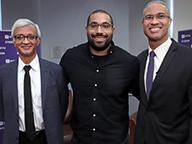Faculty News
—
In a co-authored op-ed, Professor Andrew Hinkes explores how regulation by the Office of Foreign Asset Control (OFAC) could impact the cryptocurrency market
—

Excerpt from CoinDesk -- "The list of Specially Designated Nationals (SDNs) includes individuals and entities associated with sanctioned governments, terrorism, trafficking in weapons of mass destruction, and illegal drug trafficking. This list includes varying types of records, including in some cases only names, but in other cases names, addresses, aliases, etc. Financial institutions would be required to screen any virtual currency address provided for a transaction against a list to be provided by OFAC, and to either report, deny service to, or block transactions involving any listed addresses."
Faculty News
—

Excerpt from CoinDesk -- "The list of Specially Designated Nationals (SDNs) includes individuals and entities associated with sanctioned governments, terrorism, trafficking in weapons of mass destruction, and illegal drug trafficking. This list includes varying types of records, including in some cases only names, but in other cases names, addresses, aliases, etc. Financial institutions would be required to screen any virtual currency address provided for a transaction against a list to be provided by OFAC, and to either report, deny service to, or block transactions involving any listed addresses."




















